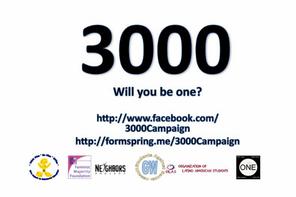 George Washington University students have taken action against sexual assault on their campus, and, interestingly, are using the social media site Formspring. Several student organizations have banded together to create the “3000 campaign” (which makes reference to the estimated number of GW students who will experience sexual asaault). The campaign adeptly uses Formspring to allow students to anonymously report sexual assaults. The Formspring page is here. See DC sex and gender columnist Amanda Hess’ excellent coverage of this story here and here.
George Washington University students have taken action against sexual assault on their campus, and, interestingly, are using the social media site Formspring. Several student organizations have banded together to create the “3000 campaign” (which makes reference to the estimated number of GW students who will experience sexual asaault). The campaign adeptly uses Formspring to allow students to anonymously report sexual assaults. The Formspring page is here. See DC sex and gender columnist Amanda Hess’ excellent coverage of this story here and here.
Cyborgology editors PJ Rey and I have made the point before that social media is often painted as dangerous without looking to the new ways in which it provides support. Yes, bullying occurs on Facebook, but we can also think about how social media has been leveraged to provide social support, for instance, with Dan Savage’s YouTube-based It Gets Better Campaign. I also recently discussed Egypt’s Harassmap, which helps women organize over social media to fight harassment. The site that has been arguably most notorious in the recent fervor over cyber-bullying is Formspring.me (for those who do not know, users on this site answer questions often asked anonymously). The site is connected with a suicide and researcher danah boyd has stated that,
“While teens have always asked each other crass and mean-spirited questions, this has become so pervasive on Formspring so as to define what participation there means.” (from here)
However, while what boyd said was true when she said it (ten months ago), social participation on Formspring is about more than just bullying. Now it is a a tool that can also be used to fight assault and harassment, even that which occurs in the physical-world. Thus, any conversation about the role social media is coming to play in society should take into account both the potential risks and benefits of these emerging platforms. The anonymity of Formspring breeds both the secrecy needed to mercilessly criticize others as well as to provide voice to “silent problems” like sexual assault.

Comments 2
3-21-11: Cybersupport « Maryland Morning with Sheilah Kast — March 21, 2011
[...] Jurgenson and P.J. Rey call this “cybersupport.” You can see it at sites like Harassmap, the “3,000 Campaign” against sexual assault, and [...]
BART Pulling the Plug Makes Us Less Safe » Cyborgology — August 15, 2011
[...] or sexting. We have tried to point out that social media has also provided wonderful examples of social support, such as outing street harassers or the “It Gets Better” project. This same fallacy to view new [...]